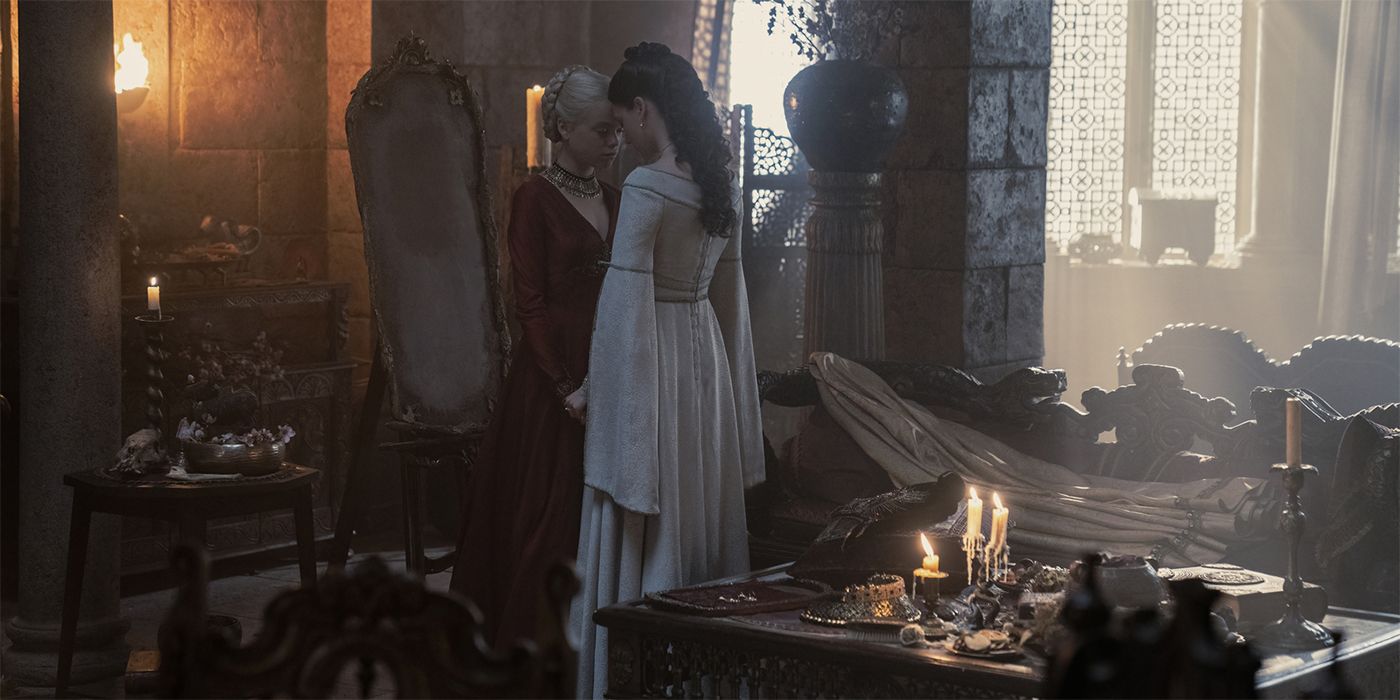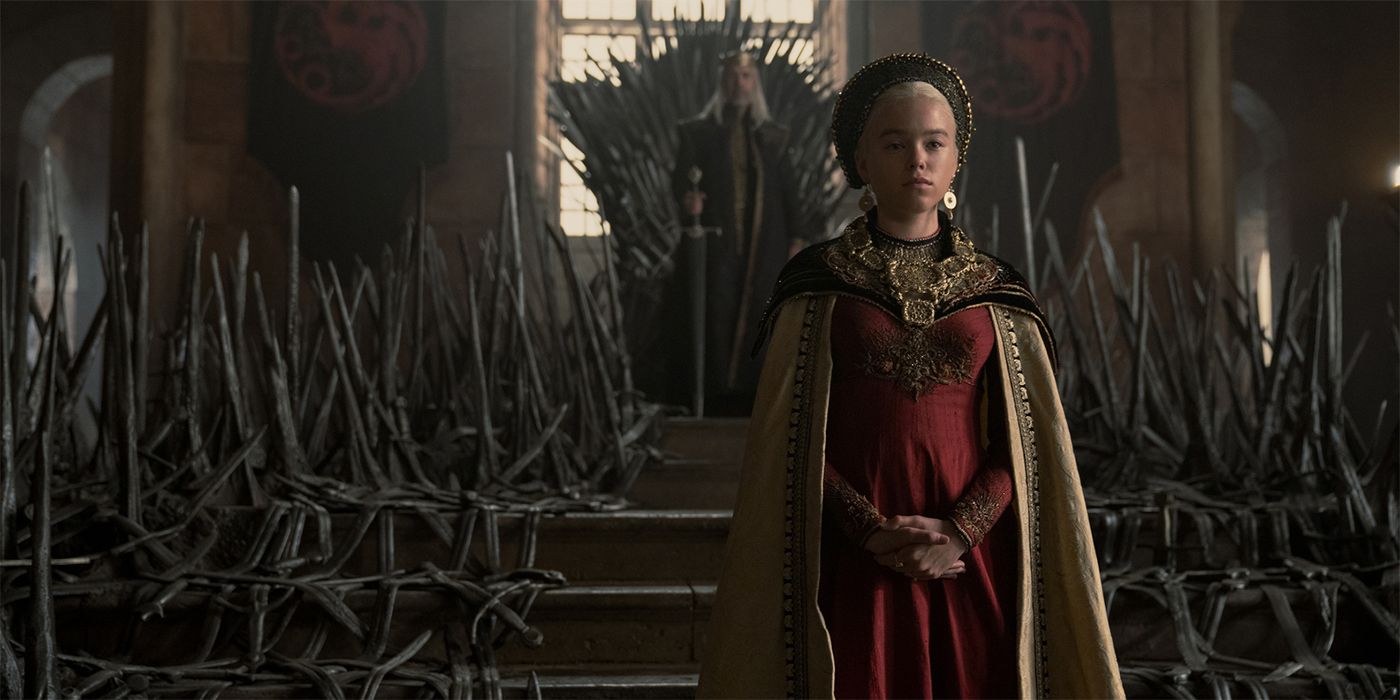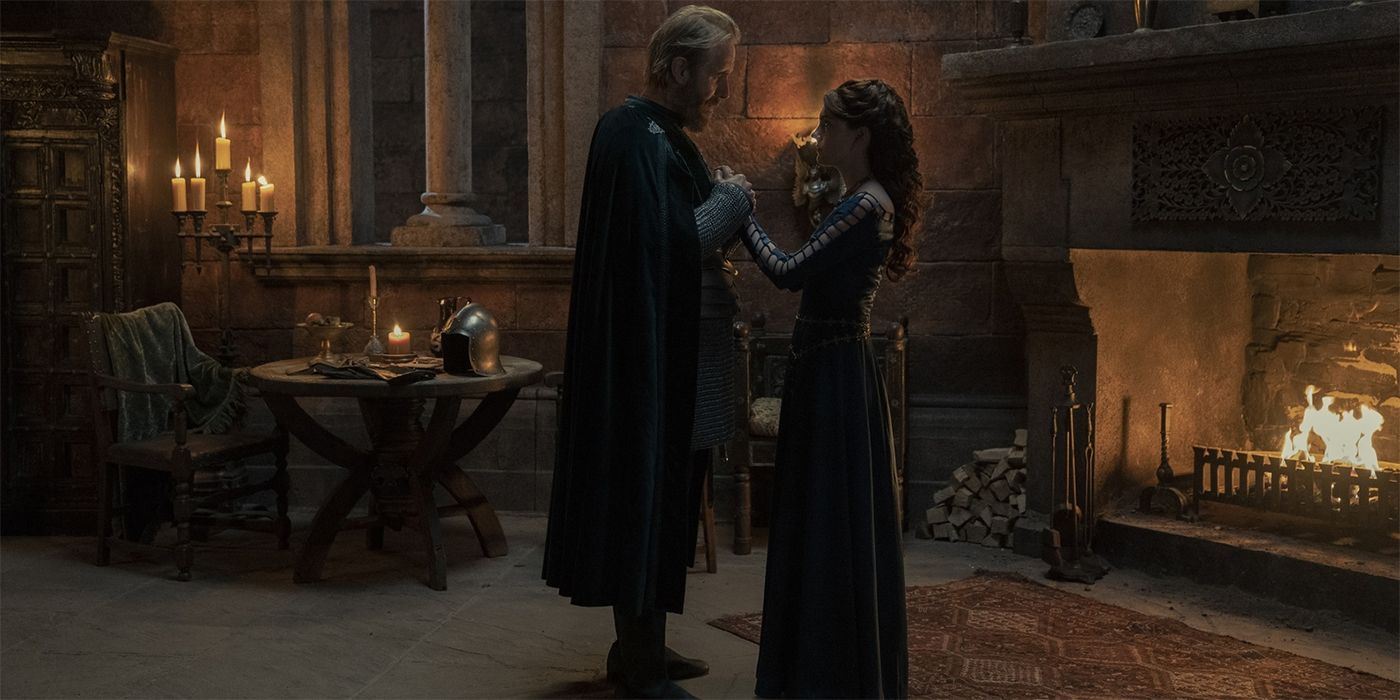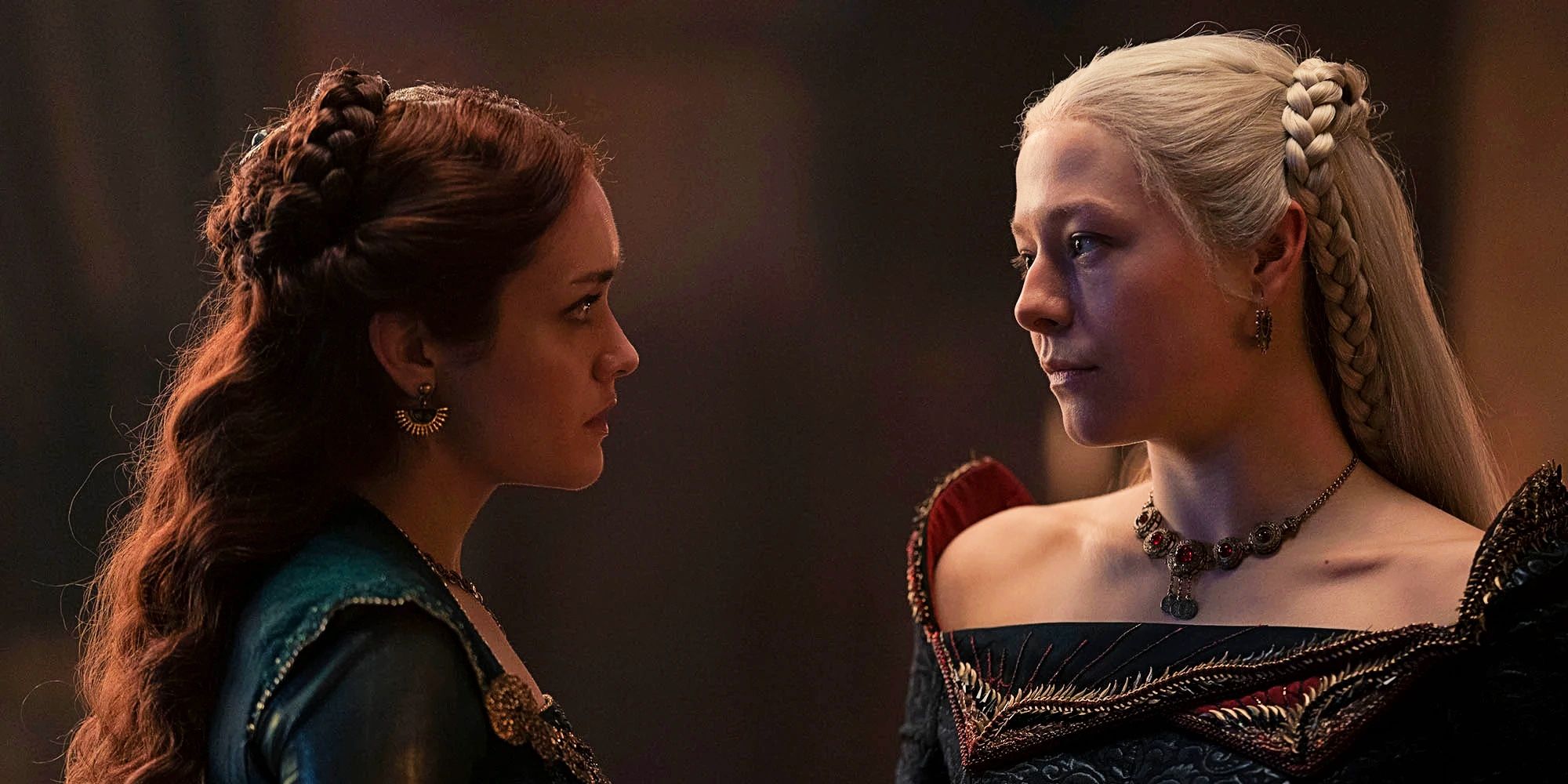House of the Dragon, premiering August 21 on HBO, is the first Game of Thrones spinoff to see the light of day. Taking place 200 years before the Stark and Lannister-centric original series, the new show will focus on House Targaryen at the height of its power. Of course, a civil war is lurking around the corner when Viserys I's heir Rhaenyra (Emma D'Arcy) and his second wife Alicent Hightower (Olivia Cooke) face off, sparking a series of events that will ripple through the Seven Kingdoms.
But showrunners Ryan J. Condal and Miguel Sapochnik (who also serves as director for several episodes of House of the Dragon season 1) are telling a generational tale that begins with relative peace and prosperity, at a time when the younger more innocent Rhaenyra and Alicent are bosom friends. Their teenage versions are played by Milly Alcock (Les Norton) and Emily Carey (Casualty) respectively, allowing audiences to witness what shapes their very divergent paths down the line.
During a recent round table interview, Screen Rant and other media outlets had to opportunity to speak to Alcock and Carey about how each of their characters respond to the misogynistic pressures of Westeros, what they learned from their onscreen father, and fans might find most surprising about House of the Dragon season 1.
Your characters get some of the biggest changes from the book by making them friends early on. Tell me about what felt important to you in establishing those characters.
Milly Alcock: Yeah, I think what felt important to us was basically establishing that these two women genuinely adore each other, that they really love each other, and that they really lean on each other. Then as the story progresses, and certain decisions are made that impact their relationship, we see that shift. And as an audience, we really feel the heartbreak that these two women feel between each other.
Emily Carey: 100%. A lot of those decisions are of course out of their control as women, it's important to note. But I think for us to establish that chemistry, we were just quite lucky that we get along in real life. We don't hate each other. [Laughs] And I think a lot of it happened organically.
Screen Rant: The history of Westeros, and especially of House Targaryen, deals a lot with misogyny. How do you deal with that in the setting of the series, and how do your characters fight back?
Emily Carey: I think part of the key for Alicent is she doesn't fight back. I think she doesn't know how to, and I think parts of her doesn't want to—until she's there. And then maybe she regrets certain decisions and certain choices. But I think she doesn't have the power to fight back, mainly because she's a child when we find her.
But I said it before and I'll say it again: my favorite thing about this show is that, yes, we showcase misogyny and we show how it affected the women in this world, and how it relates to these to these characters—whether it's Alicent or Rhaenyra or Rhaenys even. But when we take away the storyline and theme of misogyny, these characters still have an arc and are still complex women onscreen. They're not just there to serve the purpose and to show misogyny; they are human beings put onscreen. And I think that's a brilliant thing.
Milly Alcock: I think, ultimately, it's down to the writing. And what the show really leans on is how these two women are met with the same kind of patriarchy, but they react in entirely different ways. Because of their given circumstances, and because of who they are, and the privileges that they've been afforded within their lives.
I think that Rhaenyra especially is a fighter. She fights for what she wants, and she doesn't like to take no for an answer. But I think that these two women deal with it entirely differently, and that's what makes the show quite interesting. Because I think that a lot of people can see themselves in Rhaenyra just as much as Alicent.
What can you share about your journey into the world of Westeros? In what ways did Game of Thrones, or even working with George R.R. Martin, inform your take on your roles?
Emily Carey: I think, for me, the Thrones world just gave me context mainly. I'd never seen the show before I booked the role, and to come into the world of Westeros completely blind is impossible. There's so much to take in and, as you know, it's so detailed. Every tiny thing you could possibly think of is written like it's a history book.
For me, it provided a lot of support, and it helped me prep for the role.
Milly Alcock: It's interesting, because I only met George at Comic-Con. We hadn't met him until before then, but I completely agree with Emily. The book created a context into what was at stake for these women, and it really helped me understand what certain things meant. I then went into my own personal life and experiences, and figured out how to translate that into something that I've lived and experienced on Earth, as opposed Westeros.
We've had this decade of girlboss stories, including Daenerys to a certain extent and the end of Game of Thrones. From what I've seen of House of the Dragon, both of your characters are an exception to that rule and feel more nuanced in consideration of that. How do you see your characters playing into this more complicated portrayal?
Emily Carey: I think that's why we're here. I think that's why they wanted the younger versions of these women; to show how they become these adult women.
I think Alicent is a prime example of one of the gray characters that George talks about. Alicent is one of those people that the fans are expecting to hate straight off the bat. But hopefully we can bring in a new take on her, and I think people will even sympathize with her slightly. There's so much more to her than expected and, although she follows the rules and is very dutiful, she has this fierce fieryness underlying [that].
In a sense, it takes some kind of power to even follow the rules in this world.
Milly Alcock: [The version] of feminism that most of us have been presented kind of ignores the actual conflict that we're faced with as women, where usually things don't go your way. And I think that Alicent is a prime example of someone who struggles to combat that. But that's the reality of a lot of women, because it takes a lot of courage to not submit, when we've been taught inherently our whole lives to be submissive. I think that's why she's a bit of an underdog.
Emily Carey: She is. And eventually, when she does break out of her box—there's a sequence where she does fight back—the question is whether she is truly doing it for herself, or if she's doing it for the people around her.
A lot of what I got to play out is what pushed her to that point, or rather who pushed her to that point. A lot of the time, it's the man in her life, and it was a really interesting storyline to try and figure out and portray. I think it's gonna be interesting to watch back onscreen as well. I think I'm gonna notice things that I hadn't noticed.
Milly Alock: I think the show looks at, "Who do you serve? Yourself or the realm?" And Alicent and Rhaenyra are the opposite; they both choose different parts.
Emily Carey: But do they choose, or are they pushed?
Screen Rant: Speaking of the men in your lives, you each have very different relationships with your fathers. What is it like to explore that dynamic over the course of the season, and also to work with such venerated actors?
Milly Alcock: I mean, what a delight. The best masterclass I've ever had in my entire life is working opposite Paddy Considine. He's an absolute genius; he's so magnetic to watch and to work with. Ultimately, I felt very secure in having him playing King Viserys. And I think that he's quite an interesting person, because he's a great king [but a] hopeless dad. He doesn't know how to talk to women.
I think that Paddy brings a real sense of empathy and warmth. You see him; he's trying so hard to say the right thing and to do the right thing, but he's just a bit of a wet wipe. He just doesn't know which decision to make, and Rhaenyra is the opposite of that. And that frustrates her.
I absolutely adore me and Paddy's scenes together. I think in [episode] 1 we see a very different version of their relationship, and by [episode] 5 Rhaenyra's really come into herself, and she's an equal. I think that that's when he finally sees her, and that's all she wants.
Emily Carey: This was one of the things I was most nervous about coming into this job. Some of Alison's key relationships are things that I can't relate to, and one of them was the father-daughter relationship. I don't have that in real life, and as an actor, you have to draw on your own personal life to feed into your work. Honestly, I really, really struggled. With the help of [director] Clare Kilner, Miguel, and of course Rhys Ifans—who plays Otto—we sort of came together as a collaborative to figure it out. But it was a process and a half.
The thing with Otto and Alison is that they love each other dearly, but the key part [missing] is the mother. The mother figure brings a family together like that, and so Otto and Alicent don't know how to communicate at all. So, in the scenes where they should be saying that they love each other, where it should be an emotional moment, the emotion comes out in an outburst. Usually they end up arguing, and I think that was a lot of fun for us to play around with.
There's a tension between them; the tension is love, but it's palpable, and it comes across as anger and fire. I think Alicent is blinded by the love that she has for her father a lot of the time, and she sees him very differently as the story progresses. I think a lot of the time the audience also grows with Alicent, and you start to see him differently too.
Before shooting, did you get a chance to sit down with Olivia and Emma to be on the same page for the characters? Or did you work completely separately?
Ally Milcock: No. We asked about it. We were like, "So, when are we gonna meet Em? When are we gonna meet Liv?" And Miguel was like, "Uhh..." And I was like, "Oh, this is obviously a choice."
Very quickly, we as a cast trusted Miguel wholeheartedly in his direction for the show and direction in general. So, I just respected that and took a step back, and just had faith. I know that he'll tell me if I'm steering too far off track, and I think that it's all worked out.
Emily Carey: 100%. And I think, as much as we trusted Miguel, he put trust in all four of us as actors that we'd leave it off in the right place, and they'd pick it off in the right place as well.
10 years is a long time. People change; circumstance, context—everything changes. But not only that, we're taking them from young women into fully grown adults. Of course, there's a huge amount of growing up to be done as well. It's almost like we're playing different people; complete different characters.
But we went for a set visit quite early on, and we watched Liv and Emma do their thing on set. It was strange, because obviously it was like watching the same character. But it was a transformed version. It was strange, but fascinating. And they are, of course, both phenomenal actors.
I've heard so many people in the cast talk about getting to the set and feeling like it's fully built. Was there a piece of it that audiences might not see, but that you think was really important or fun?
Milly Alcock: The tapestries. Basically, we get to the Red Keep and we're walking around. We look up, and we're like, "Huh, that's interesting..." There are tapestries of men and women making love, women and women making love, dragon making love in the mix as well with the humans there. But everywhere—everywhere, in my room, in my dad's room. It was just very like, "Is no one else talking about this? Is no one else seeing this?"
Emily Carey: Uncensored tapestries on every wall of the Red Keep. That was just so unexpected.
Screen Rant: I think everyone who has watched Game of Thrones or read A Song of Ice and Fire is obviously familiar with House Targaryen. But what do you think fans will be most surprised by in this series?
Emily Carey: Alicent, if you've read the book, there's one sentence that says what she was like at 14. It says something like, "She was precocious and read to the old King Jahaerys." That's kind of all you have, and then it comes back to her as an adult, so I had a huge amount of freedom.
I think fans forget that you do grow up, and you're different as a child than you are as an adult. So, the Alicent they read about might not be the Alicent they're met with first.
What can you share about Ryan and Miguel as collaborative partners that really distinguishes them to you?
Emily Carey: For me, personally, Miguel was kind of my role throughout the entire job. Him and Ryan were not just there as on-set guidance, but sort of offset as well. Whenever we needed anything, they were more than happy to help on a personal and emotional level as well.
What stands out for me with Miguel as a director, I think, [was] my first heavy scene that I'd done on set. With Paddy in episode 1, funnily enough. Miguel had managed to cotton onto how I work so quickly. In the scene, when the camera was on me—instead of directing me, he directed Paddy. I had no idea what was going on, but as an actor, I personally worked very organically. And sometimes when I'm given direction, it takes me a few goes to warm up into it, because I'm too conscious of thinking about the direction.
Instead, he didn't give me anything to think about. He gave Paddy something to think about, and I just bounced off and reacted. He knew exactly how to provoke the right reaction out of me, which completely blew my mind and fascinated me. He's incredible.
And Ryan is like an encyclopedia. You can ask him anything about this universe, and he will list off facts like it's just no problem.
Milly Alcock: Ryan is really the brain of the show, but Miguel is the heart of the show, hands down. Just the way that he would interact with actors, and the way that he interacted within the world. He was just such a great role model for all of us, really. I think he allowed me to get performances that I didn't even think I was capable of. He allowed me to surprise myself, and I was excited every day to go on set that he was there. So, I cannot speak more highly of him, basically.
House of the Dragon Synopsis
House of the Dragon, the eagerly awaited prequel to Game of Thrones, is based on George R. R. Martin’s Fire & Blood. Set some 200 years before the events that unfolded in Game of Thrones, this is the remarkable, turbulent story of the House of Targaryen.
Check out our other roundtable interviews with House of the Dragon stars Matt Smith & Fabien Frankel, Emma D'Arcy & Olivia Cooke, Steve Toussaint & Eve Best, and Paddy Considine, as well as with showrunners Ryan Condal & Miguel Sapochnik.
House of the Dragon premieres August 21 on HBO and HBO Max at 9pm ET/PT.




